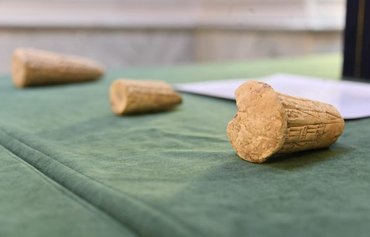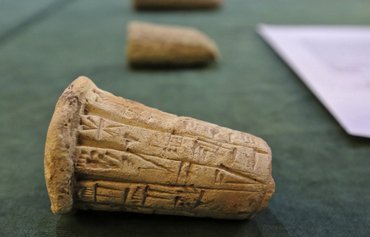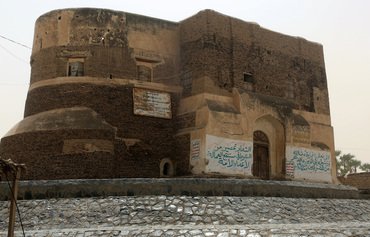Thousands of Iraqi artefacts recovered from the United Kingdom in May after spending a century at the British Museum are being prepared for display at the Iraq Museum in Baghdad.
The shipment was the second massive retrieval of Iraqi antiquities from abroad.
During a June 10 ceremony to open the boxes of artefacts at the national museum, Iraqi Prime Minister Mohammed Shia al-Sudani stressed that caring for national antiquities is one of the priorities of his government.
He said the government will continue working to recover Iraqi antiquities abroad.
![Boxes containing artefacts that Iraq lent to the United Kingdom 100 years ago for research and maintenance purposes are seen here in a photo posted online on May 5. [Iraqi Ministry of Culture]](/cnmi_am/images/2023/06/27/42582-iraq-culture-ministry-600_384.jpg)
Boxes containing artefacts that Iraq lent to the United Kingdom 100 years ago for research and maintenance purposes are seen here in a photo posted online on May 5. [Iraqi Ministry of Culture]
![Iraqi President Abdul Latif Jamal Rashid speaks at a May 9 press conference held at Baghdad International Airport upon the arrival of Iraqi antiquities recovered from the United Kingdom. [Website of the Iraqi President]](/cnmi_am/images/2023/06/27/42583-iraq-president-artefacts-600_384.jpg)
Iraqi President Abdul Latif Jamal Rashid speaks at a May 9 press conference held at Baghdad International Airport upon the arrival of Iraqi antiquities recovered from the United Kingdom. [Website of the Iraqi President]
In August 2021, Iraq recovered from the United States more than 17,000 looted and smuggled antiquities that make up an essential part of its history and cultural heritage, and most of which are 4,000 years old.
When the "Islamic State of Iraq and Syria" (ISIS) seized control of Ninawa province nine years ago, al-Sudani said, its concern was to kill Iraqis and steal the country's antiquities.
Antiquities are the key foundations of the national identity that Iraqis cherish, he said, adding that cultural treasures must be preserved for future generations.
Al-Sudani called for the development of an action plan to attract archaeological tourism to Iraq and to organise student tours and visits, to introduce Iraqi youth to their country's history.
Visiting the Iraq Museum, which stores the history of Mesopotamia, is the gateway to gaining knowledge and national memory, he said.
On May 9 and during Iraqi president Abdul Latif Jamal Rashid's trip to the United Kingdom to attend King Charles III's coronation, Iraq recovered 6,000 artefacts from ancient Iraqi civilizations, placed in 38 boxes.
The Iraqi government also retrieved four boxes containing replicas for study purposes, two paintings and six boxes of books.
Cultural heritage
The recovered artefacts were lent to the British Museum for academic research, maintenance and translation purposes in 1923, said Iraqi State Board of Antiquities and Heritage (SBAH) director Laith Majeed Hussein.
Recovering a quantity of national antiquities of this size was a difficult task, he told Al-Mashareq, but it was accomplished with co-ordinated efforts among all relevant government agencies and the British side.
Efforts to recover Iraqi artefacts will not stop, and more of them will be repatriated in the near future, he added.
During a press conference held at Baghdad International Airport after the antiquities were unloaded, Rashid said the recovery "embodies the keenness to protect the cultural heritage [of Iraq]".
This heritage "represents the national identity and the historical and cultural memory of the country", he said.
Deputy Minister of Foreign Affairs for Multilateral and Legal Affairs Omar al-Barzanji credited the recovery to the hard work of al-Sudani, the foreign affairs and culture ministries, the Iraqi Embassy in London and the UK government.
"The artefacts represent an important part of the country's history and culture, and their recovery is a new gain for Iraq on the path to restoring its wealth and historic legacy, which is one of the sources of its strength," he said.
'Recovery diplomacy'
Iraq's Ministry of Foreign Affairs describes efforts to return artefacts to the country as "recovery diplomacy", given how active its diplomatic missions abroad are in communicating with various governments during this process.
Over decades in the British Museum, Iraqi antiquities have provided researchers and specialists with extensive knowledge that contributed to their studies, which has advanced historical and human research, al-Barzanji told Al-Mashareq.
The Iraq Museum is currently preparing the recently returned antiquities for display, officials said.
The government plans to display the returned artefacts in other museums as well, and open new exhibition halls, they said.
It also plans to complete the reconstruction of the Mosul and Anbar museums, and supply them with recovered antiquities and those discovered in recent excavations to display in the renovated facilities.

![Iraqi Prime Minister Mohammed Shia al-Sudani attends a June 10 ceremony at the Iraq Museum to open boxes of artefacts returned to Iraq from the British Museum in May. [Al-Sudani's media office]](/cnmi_am/images/2023/06/27/42581-iraq-musuem-sudani-600_384.jpg)






